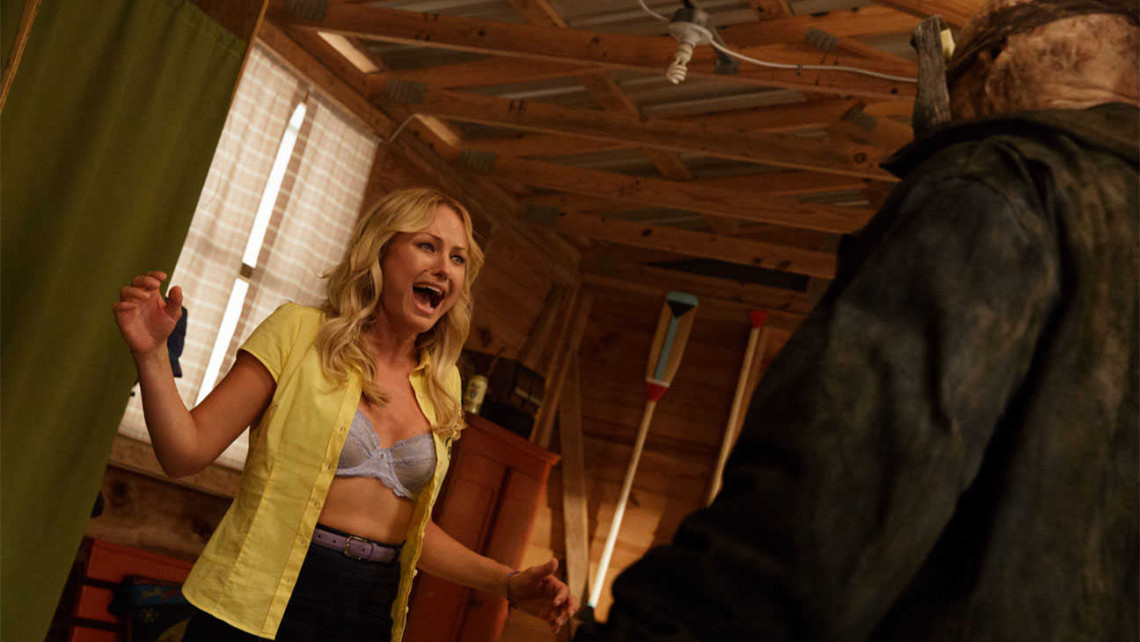It’s not every day that you walk into a horror movie expecting it to make you choke up. Usually, we pay the price of admission to scare ourselves silly and enjoy some good old-fashioned exploitative voyeurism; we watch imperiled characters get bumped off with hideous creativity, and once it’s all over, we have the privilege of being able to step out into the lobby and appreciate being alive. In Todd Strauss-Schulson’s The Final Girls, the contract between the viewer and the film gets a rewrite. Our renewed zest for life remains intact, but it’s sourced from a different place than we expect. Instead of feeling grateful for surviving – hurray, the killer didn’t disembowel me! – we feel grateful for the people who make the journey into mortality with us.
That makes Strauss-Schulson’s film sound like a bummer. But The Final Girls (not to be confused with Tyler Shields’ unapologetically terrible Final Girl) is the exact opposite of that; it’s a horror comedy that emphasizes the latter over the former without depriving its audience of the genre’s fun. There’s something deliciously wicked about subjecting oneself to the experience of fear in the name of entertainment. The Final Girls gets that, but it’s less interested in exploring the fear than in celebrating it; it’s a meta movie that goes deep on deconstructing the slasher formula. Like most deconstructions, its engine runs on a deep, abiding love for cinema’s rogues’ gallery of mask-bedecked maniacs. If you bleed Friday the 13th, Strauss-Schulson made The Final Girls just for you. If not, then there’s something more universal going on here: One young woman’s struggle to come to terms with her mother’s death.
The young woman in question is Max (Taissa Farmiga). Her mother is Amanda (Malin Akerman), a scream-queen icon known for her role in a fictitious and prototypically 80s slasher romp called Camp Bloodbath. Three years after Amanda’s passing, Max remains in a bereaved stupor. One night, she’s cajoled by her friends – BFF Gertie (Alia Shawkat), crush Chris (Alexander Ludwig), mean girl Vicki (Nina Dobrev), and horror geek Duncan (Thomas Middleditch) – into attending a midnight screening of Camp Bloodbath against her better judgment. Partway through the film-within-a-film, a fire breaks out, and the quintet heads through the screen to theoretical safety, but their would-be escape unexpectedly transports them into Camp Bloodbath. Their only hope of getting out in one piece is making it to the credits.
The Final Girls’ premise is as inexplicable on paper as it is exciting in practice. As a meta work nestled in horror trappings, the film has already earned comparisons to Drew Goddard’s 2012 meta masterpiece The Cabin in the Woods, though frankly, The Final Girls feels closer to Joseph Kahn’s Detention in terms of its winking cheekiness. Strauss-Schulson instills his movie with a kinetic enthusiasm for slasher fare, and he comfortably leans into the rabbit-hole surreality of his basic conceit rather than soften it. The film acknowledges the “buts” and “what ifs” that demand acknowledgement: Max and the gang can’t simply wait out Camp Bloodbath’s running time because they’re stuck in a loop a la Groundhog Day, but with more dead teenagers. And the movie’s slasher, a Jason Voorhees surrogate named Billy, doesn’t cotton to their unexpected presence, either. They’re forced to engage with the film and its characters, most of all Amanda, playing shy counselor Nancy.
If the movie’s magical realism and numerous moving parts make it sound needlessly complex, don’t worry: Simplicity is key here. The Final Girls has a lot going on but lays out all of its rules, such as they are, cleanly and without making a fuss. Even better, it manages to make every character pop. Nobody winds up lost in the background, though certain individuals manage to stand out from their peers. (Adam DeVine, as Camp Bloodbath’s “macho alpha perv” slasher trope, slays, even though he’s playing with a comic tenor that’s closer to 2015 than to 1986.) But the film’s primary goal is to let Max resolve her unresolved feelings over losing Amanda. Strauss-Schulson has a clear fondness for slashers and he’s having fun exploring the slasher realm in clever ways – characters nearly trip over title cards like pebbles in the road and take selfies with Billy – but he doesn’t just use the film as a way of connecting with film history. He’s using it to connect with real heartache and the universal pain of letting go.
That makes The Final Girls something special. Like Jason Lei Howden’s Deathgasm, it’s a movie that’s best seen with a crowd of horror nuts; it’s immensely fun and packs a great, self-aware sense of humor that’ll play perfectly for dedicated and casual slasher fans alike. But the film’s exploration of grief resolution through cinema is so keenly emotional as to add a new dimension to its structure. The Final Girls is a refreshing addition to a sub-category of horror that’s had its bones picked so clean that they gleam; what it lacks in body count and imaginative gore, it more than makes up for with sharp commentary and surprisingly tender sentiment.





















One thought on ““The Final Girls” Is Deliciously Wicked and Surprising”
Pingback: Review: The Final Girls, 2015, dir. Todd Strauss-Schulson | A Constant Visual Feast